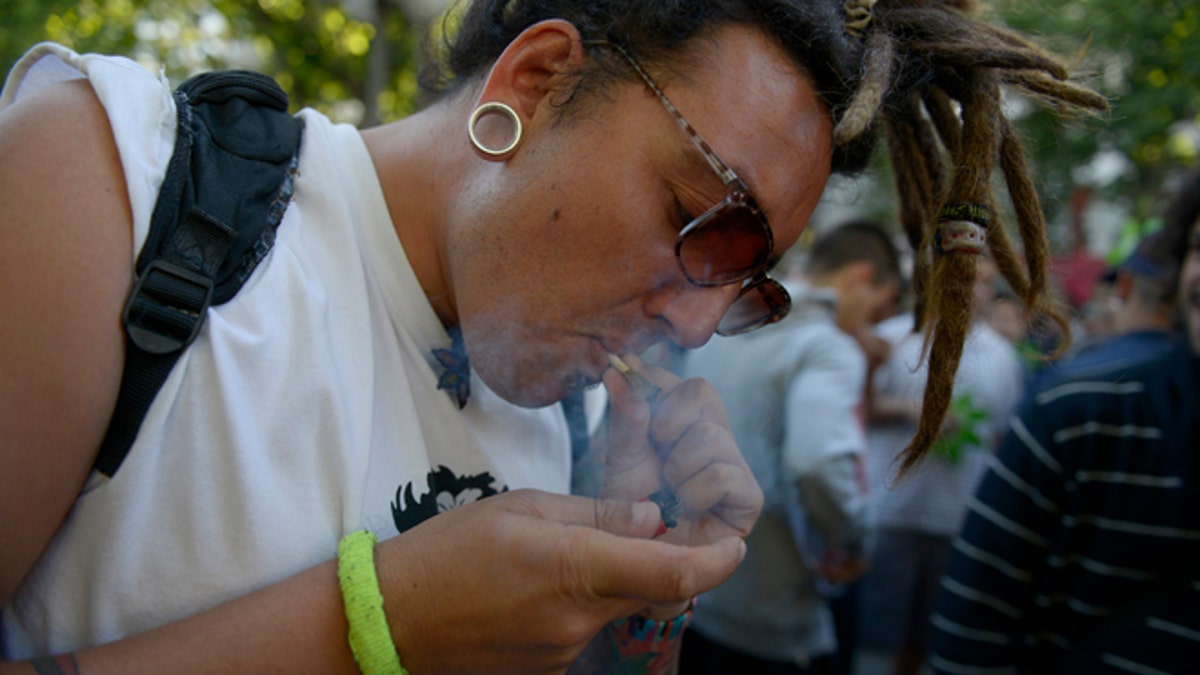
A man smokes a marijuana cigarette during a demonstration in support of the legalization of marijuana outside the Congress in Montevideo, Uruguay, Tuesday, Dec. 10, 2013. Uruguay's Senate was finishing its final debate Tuesday before voting on a plan to create the world's first national marijuana market, with the state regulating the entire process of growing, selling and using a drug that is illegal almost everywhere else. (AP Photo/Matilde Campodonico) (AP2013)
While Uruguayans celebrate the legalization of marijuana in the South American nation, an international watchdog agency claimed that the country’s move violates an international convention on drug control.
The International Narcotics Control Board said that the move contravenes the 1961 Single Convention on Narcotic Drugs, of which it said Uruguay is a member. The convention seeks to limit the possession, use, trade in, distribution, import, export, manufacture and production of drugs exclusively to medical and scientific purposes. It also combats drug trafficking through international cooperation to deter and discourage drug traffickers, the United Nations Office on Drugs and Crime stated.
“Cannabis is controlled under the 1961 Convention, which requires States Parties to limit its use to medical and scientific purposes, due to its dependence-producing potential," INCB president Raymond Yans said in a statement.
The INCB is an independent international agency charged with monitoring enforcement of United Nations drug treaties.
Uruguay has become the first country to create a national marketplace for legal marijuana, with the government regulating the production, sales and use of pot in a bold bid to control addiction and drug violence.
The Senate gave final legislative approval to the bill late Tuesday, and President José Mujica, who campaigned for the legislation, is expected to sign it into law. The 78-year-old president has said he wants the market to begin operating next year.
The INCD argued that Uruguay did not take into consideration the addictive and health implications that marijuana use entails and that Uruguayan legislators ignored the “available scientific evidence, including that presented to the parliamentary committees by Uruguay’s own scientific community.” It also criticized the statement that Uruguay was primarily focused on reducing crime.
The decision “will not protect young people but rather have the perverse effect of encouraging early experimentation, lowering the age of first use, and thus contributing to developmental problems and earlier onset of addiction and other disorders,” Yans said.
The legislation to create a government-run marijuana industry was also opposed by two-thirds of Uruguayans, recent opinion polls said.
Mujica went ahead and pushed for the move anyway. He argued the global drug war is a failure and said bureaucrats can do a better job of containing addictions and beating organized crime than through the use of force with police officers, soldiers and prison guards.
Uruguay's drug control agency will have 120 days, until mid-April, to draft regulations imposing state control over the entire market for marijuana, from seed to smoke.
Everyone involved must be licensed and registered, with government monitors enforcing limits such as 40 grams a month any adult will be able to buy at pharmacies for any reason or the six marijuana plants that license-holders will be allowed to grow at home.
Other countries are watching what happens in Uruguay very closely. The Netherlands has permitted the sale of marijuana in coffee shops and certain U.S. states have permitted the use of marijuana as well as its limited sale, production and distribution.
The INCD said it was open to discussions with Uruguay to further consider the future of the country’s law.
“The Board regrets that the Government of Uruguay did not respond to INCB to engage in a dialogue prior to further consideration of the law,” the statement said. “INCB reiterates its call to the Government of Uruguay to engage with the Board to ensure that Uruguay continues to respect and implement the treaties to which it is a party.”
The Associated Press contributed to this report.
Follow us on twitter.com/foxnewslatino
Like us at facebook.com/foxnewslatino
